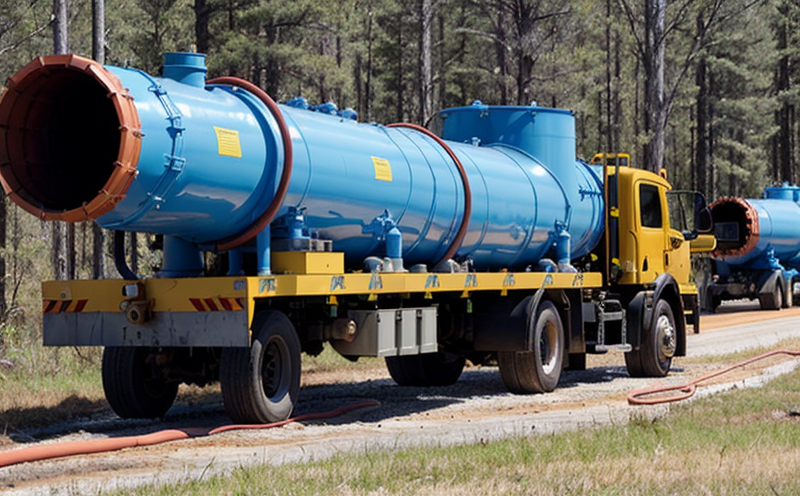API 574 Pipeline Corrosion Testing and Inspection
The API Standard 574 is a crucial guideline in the pipeline industry designed to ensure safe operation and integrity of natural gas pipelines. This standard focuses on providing methods for assessing external corrosion on long-term buried or submerged steel pipelines used for natural gas transportation.
API 574 mandates that all pipeline operators must conduct periodic inspections to detect signs of external corrosion, which can lead to potential failures if left unchecked. These inspections are essential not only for compliance with regulatory bodies but also to safeguard public safety and minimize environmental impacts associated with pipeline leaks or ruptures.
The process typically involves several steps including surface preparation, coating evaluation, cathodic protection effectiveness checks, and direct assessment of the pipe’s condition using various non-destructive testing (NDT) techniques such as ultrasonic inspection, electromagnetic testing, and leak detection. Each step plays a vital role in comprehensively evaluating the pipeline's structural integrity.
Surface preparation is critical; it ensures accurate data collection by removing any dirt, rust, or old coatings that could interfere with NDT readings. Coating evaluation helps determine whether existing protective layers are still intact or if they need replacement due to deterioration caused by environmental factors like saltwater exposure or soil acidity.
Cathodic protection effectiveness checks assess the performance of electrical systems intended to prevent metal from corroding by making it less attractive to electrons and thus preventing oxidation reactions. Direct assessments provide detailed visual inspections where technicians physically examine sections of the pipeline above ground, looking for signs indicative of corrosion damage such as pitting or cracks.
By adhering strictly to API 574 guidelines during these comprehensive evaluations, operators can effectively manage risks associated with external corrosion issues while ensuring optimal operational efficiency and longevity of their assets. The ultimate goal is not just compliance but also proactive maintenance aimed at extending the useful life span of pipelines while maintaining high safety standards.
For quality managers, compliance officers, R&D engineers, and procurement teams working within the power & utilities sector, understanding API 574 is paramount as it directly impacts decision-making processes related to asset management strategies. Proper implementation ensures reliable performance across all pipeline networks involved in natural gas distribution and transportation.
Why It Matters
The importance of conducting thorough API 574 pipeline corrosion testing cannot be overstated, especially given the critical nature of natural gas infrastructure in our modern world. This standard serves as a safeguard against potential hazards that could arise from neglected or poorly maintained pipelines.
It helps prevent catastrophic failures leading to loss of life and property damage.
Ensures regulatory compliance, avoiding costly penalties associated with non-compliance.
Promotes safer work environments by minimizing risks faced by maintenance personnel.
In addition to these tangible benefits, regular API 574 inspections contribute significantly towards enhancing overall operational efficiency. By identifying issues early on through meticulous examination procedures outlined in the standard, proactive measures can be taken to address them before they escalate into larger problems requiring more extensive interventions later down the line.
Applied Standards
The primary reference for this service is API Standard 574. This document provides comprehensive instructions on how to perform external corrosion inspections on long-term buried or submerged steel pipelines used in natural gas transportation systems. It encompasses various methodologies and techniques applicable depending upon specific conditions encountered during field operations.
Other relevant international standards include ISO/IEC 17025, which sets requirements for the competence of testing laboratories; EN 14339:2003, dealing with the design and construction of above-ground pipelines conveying natural gas; and ASTM G67-18a, providing guidelines for sampling ground water from wells containing oil or gas formations.
Frequently Asked Questions
Customer Impact and Satisfaction
Enhanced Safety: Customers benefit immensely by ensuring that their pipelines remain safe, reducing risks associated with potential leaks or ruptures.
Compliance Assurance: By adhering to API 574 guidelines, customers meet regulatory requirements preventing legal issues and financial penalties.
Our clients value our expertise in providing reliable API 574 services. Through meticulous adherence to industry standards and cutting-edge technology, we consistently deliver high-quality results that exceed expectations.





